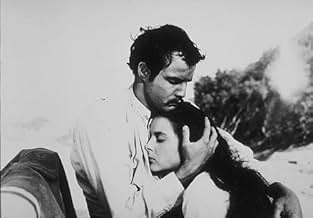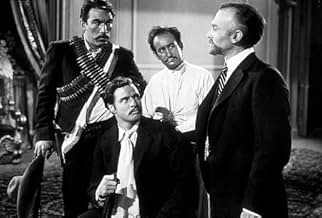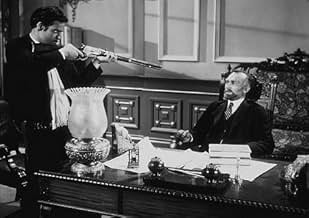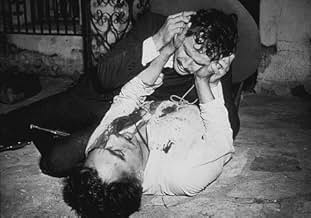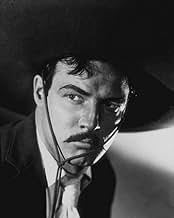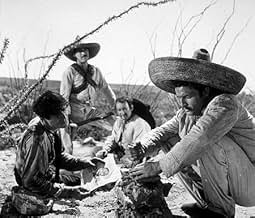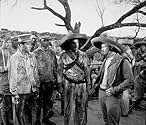VALUTAZIONE IMDb
7,2/10
13.172
LA TUA VALUTAZIONE
La storia del rivoluzionario messicano Emiliano Zapata, che ha guidato una ribellione contro la dittatura corrotta e oppressiva del presidente Porfirio Díaz all'inizio del XX secolo.La storia del rivoluzionario messicano Emiliano Zapata, che ha guidato una ribellione contro la dittatura corrotta e oppressiva del presidente Porfirio Díaz all'inizio del XX secolo.La storia del rivoluzionario messicano Emiliano Zapata, che ha guidato una ribellione contro la dittatura corrotta e oppressiva del presidente Porfirio Díaz all'inizio del XX secolo.
- Vincitore di 1 Oscar
- 5 vittorie e 9 candidature totali
Rico Alaniz
- Guard
- (non citato nei titoli originali)
Daniel Armijo
- Undetermined Secondary Role
- (non citato nei titoli originali)
Ross Bagdasarian
- Officer
- (non citato nei titoli originali)
Salvador Baguez
- Soldier
- (non citato nei titoli originali)
Recensioni in evidenza
Emiliano Zapata (Marlon Brando) was a principled, charismatic revolutionary who led peasants from Mexico in the early part of the 20th century against the dictator, Porfirio Diaz who might had proclaimed himself the father of the nation but was stealing land from the poor farmers.
What Viva Zapata shows that the cycle of betrayal is endless, one dictator goes and another one emerges. When Zapata is President his brother Eufemio (Anthony Quinn) regards it is his right to take land and property by force.
With at times a literate and clever script written by John Steinbeck, direction by the then leftist Elia Kazan the film is too uneven. There are at times some great black and white photography but the film lacks action, the plot is messy and it does not always makes sense.
Brando gives a sombre and moody performance but does look odd as a Mexican. A more natural rough-hewn performance is given by Quinn.
What Viva Zapata shows that the cycle of betrayal is endless, one dictator goes and another one emerges. When Zapata is President his brother Eufemio (Anthony Quinn) regards it is his right to take land and property by force.
With at times a literate and clever script written by John Steinbeck, direction by the then leftist Elia Kazan the film is too uneven. There are at times some great black and white photography but the film lacks action, the plot is messy and it does not always makes sense.
Brando gives a sombre and moody performance but does look odd as a Mexican. A more natural rough-hewn performance is given by Quinn.
The history of Mexico, our southern neighbor (and sometimes victim) is better known to American movie goers than the history of most countries.
You begin with the Maya (KINGS OF THE SUN), the conquest of Mexico (THE CAPTAIN FROM CASTILE), then to the founding of Father Serra's missions in California (SEVEN CITIES OF GOLD), and then the Spanish in the southwest and California (THE MARK OF ZORRO). Mexican - American history begins with the Texas War for Independence (THE ALAMO, THE LAST TEXAN, etc.). We skip to the French "intervention": JUAREZ and VERA CRUZ. Then we tend to skip the long reign of Porfirio Diaz.
Then comes the Mexican Revolution. The number of films that deal with the revolution is vast. But here are just a few titles: VIVA ZAPATA, VIVA VILLA, VILLA RIDES, THE OLD GRINGO (about Ambrose Bierce's probable death in Mexico's revolution), VIVA MARIA (a spoof but it touches on some issues), THE THREE AMIGOS, THEY CAME TO CORDURA (regarding the American Intervention under General Pershing in 1916), THE FUGITIVE (dealing with the anti-Catholic policies of the 1920s and 1930s), and even THE TREASURE OF SIERRA MADRES (when you see the business with Alfonso Badoya's bandit gang against the Federales).
The Mexican Revolution had many heroes. Many were heroes for one group but devils to another. Madero and Carranza stressed the need to have a nation that was loyal to a written constitution. Zapata would be one of the leaders of the land reform movement. Starting with Francisco Madero, going through Pancho Villa and Eufremio Zapata, going to their enemy Venusiano Carranza, to Obregon, Calles, and the great land reformer Lazaro Cardenas - the leadership was varied. The largest concentration of films is on the colorful (and murderous) Villa (a recent cable television movie was about Villa and his contract with D. W. Griffith to shoot a movie, AND STARRING PANCHO VILLA). But historians usually feel that while Villa tended to be on the side of the peasants, he had too much of the bandit in him to be a leader of the revolution's reforms. Zapata, on the other hand actually tried to reform the division of land. His work never got as far as he wanted before he was assassinated, but it was burned into the souls of the people from his region of Mexico (who still call themselves Zapatistas when involved in political protests to this day), and it did help set the stage for Cardenas' reforms in the late 1930s.
With direction by Elia Kazan and screenplay by John Steinbeck, VIVA ZAPATA is a wonderful, if simplistic view of the Revolution for American audiences. Brando underplays the lead for the most part - Zapata was not an explosive personality like Villa. Anthony Quinn is the explosive brother, whose more selfish attitudes leads to his own disaster. Of the supporting players, Alan Reed is good in his scene as Villa, where he discusses the future of Mexico with Zapata. Joseph Wiseman is properly sinister as an constant malcontent agent provocateur, insinuating each leader is too weak or unreliable to lead.
There are great set pieces - like Kazan's symbolic assassination of Madero by General Huerta's goons who drown out the little reformer/orator's voice as he tries to scream with a siren (but it makes the screams of the unheard martyr like a clarion call to Mexico).
Is it real Mexican history? Not quite - it is a version of it. But it is a really well done version of it.
You begin with the Maya (KINGS OF THE SUN), the conquest of Mexico (THE CAPTAIN FROM CASTILE), then to the founding of Father Serra's missions in California (SEVEN CITIES OF GOLD), and then the Spanish in the southwest and California (THE MARK OF ZORRO). Mexican - American history begins with the Texas War for Independence (THE ALAMO, THE LAST TEXAN, etc.). We skip to the French "intervention": JUAREZ and VERA CRUZ. Then we tend to skip the long reign of Porfirio Diaz.
Then comes the Mexican Revolution. The number of films that deal with the revolution is vast. But here are just a few titles: VIVA ZAPATA, VIVA VILLA, VILLA RIDES, THE OLD GRINGO (about Ambrose Bierce's probable death in Mexico's revolution), VIVA MARIA (a spoof but it touches on some issues), THE THREE AMIGOS, THEY CAME TO CORDURA (regarding the American Intervention under General Pershing in 1916), THE FUGITIVE (dealing with the anti-Catholic policies of the 1920s and 1930s), and even THE TREASURE OF SIERRA MADRES (when you see the business with Alfonso Badoya's bandit gang against the Federales).
The Mexican Revolution had many heroes. Many were heroes for one group but devils to another. Madero and Carranza stressed the need to have a nation that was loyal to a written constitution. Zapata would be one of the leaders of the land reform movement. Starting with Francisco Madero, going through Pancho Villa and Eufremio Zapata, going to their enemy Venusiano Carranza, to Obregon, Calles, and the great land reformer Lazaro Cardenas - the leadership was varied. The largest concentration of films is on the colorful (and murderous) Villa (a recent cable television movie was about Villa and his contract with D. W. Griffith to shoot a movie, AND STARRING PANCHO VILLA). But historians usually feel that while Villa tended to be on the side of the peasants, he had too much of the bandit in him to be a leader of the revolution's reforms. Zapata, on the other hand actually tried to reform the division of land. His work never got as far as he wanted before he was assassinated, but it was burned into the souls of the people from his region of Mexico (who still call themselves Zapatistas when involved in political protests to this day), and it did help set the stage for Cardenas' reforms in the late 1930s.
With direction by Elia Kazan and screenplay by John Steinbeck, VIVA ZAPATA is a wonderful, if simplistic view of the Revolution for American audiences. Brando underplays the lead for the most part - Zapata was not an explosive personality like Villa. Anthony Quinn is the explosive brother, whose more selfish attitudes leads to his own disaster. Of the supporting players, Alan Reed is good in his scene as Villa, where he discusses the future of Mexico with Zapata. Joseph Wiseman is properly sinister as an constant malcontent agent provocateur, insinuating each leader is too weak or unreliable to lead.
There are great set pieces - like Kazan's symbolic assassination of Madero by General Huerta's goons who drown out the little reformer/orator's voice as he tries to scream with a siren (but it makes the screams of the unheard martyr like a clarion call to Mexico).
Is it real Mexican history? Not quite - it is a version of it. But it is a really well done version of it.
The picture chronicles the Zapata life from his humble upbringing , he played a leading role in the Mexican 1910-1920 revolution until his death . A peasant delegation from Morelos state go to visit Mexican President Porfirio Diaz when Zapata (Marlon Brando) reclaims their rights .Then Zapata along with his brother Eufemio (Anthony Quinn) back to Francisco Madero (Harold Gordon) , though resident in Texas , against Porfirio Diaz . Pancho Villa (Alan Reed) in the northern Mexico and Zapata in the southern fight against Porfirio's Army winning many victories in the field . For a long time Zapata , who seemed in line for leadership of Mexico , enjoyed the sympathetic interest of the United States . Finally, Madero rises to power but General Huertas (Frank Silvera)conspires against him . Huertas rules over , and murders President Francisco Madero . Then Zapata again takes arms against Huertas and he along with Pancho Villa getting the victory in Mexico city and an eventual Presidency but he finishes leaving as a disillusioned politician . But his main enemies , the President Carranza and Obregon will fight for the power against the Villa's revolutionaries .The movie portrays until his early death , but he was assassinated when gunmen ambushed him , like it is well developed in the spectacular final shots , and it is subsequently copied at ¨Butch Cassidy and Sundance Kid¨ (by George Roy Hill with Newman and Redford).
The movie is an exciting retelling of Zapata's Mexican campaign , suffering and love , with broadened focus on the power abuse .The film gets influence from classic Westerns until famous Russian directors (Eisenstein , Pudovkin). Marlon Brando chewing up scenery in the title role in one of his best performances as the hot-tempered , simple-minded revolutionary.
Anthony Quinn won a deserved Oscar for his well portrayed secondary role as rough brother named Eufemio . Besides , powerful and insightful characterization by remainder supporting cast . Based on John Steinbeck's screenplay , plays with the facts , but overall , the movie is entertaining and interesting . Sensitive and evocative music by the two composer masters : Alfred Newman and Alex North . The motion picture was magnificently directed by Elia Kazan . It's a masterpiece and unforgettable classic movie for the cinema lovers .
The movie is an exciting retelling of Zapata's Mexican campaign , suffering and love , with broadened focus on the power abuse .The film gets influence from classic Westerns until famous Russian directors (Eisenstein , Pudovkin). Marlon Brando chewing up scenery in the title role in one of his best performances as the hot-tempered , simple-minded revolutionary.
Anthony Quinn won a deserved Oscar for his well portrayed secondary role as rough brother named Eufemio . Besides , powerful and insightful characterization by remainder supporting cast . Based on John Steinbeck's screenplay , plays with the facts , but overall , the movie is entertaining and interesting . Sensitive and evocative music by the two composer masters : Alfred Newman and Alex North . The motion picture was magnificently directed by Elia Kazan . It's a masterpiece and unforgettable classic movie for the cinema lovers .
I wonder how one of the reviewers found Brando a miscast, Brando is brilliant in the movie. With his intense anger and hatred for the exploiters and supported by good looks his performance is quite impressive. Kazan is a genius with his direction, all the main actors are superb starting from Brando, Quinn and the bad guy. I can't imagine why 'they' gave the Oscar to Gray Cooper for High Noon when Brando's performance in Viva Zapata clearly outdid Gary's, I have seen both the movies and Brando deserves it without a second thought. Well, Brando didn't care and that's the best part, he certainly is the BEST in method acting and this movie shows just how talented and gifted as an actor he was.
The movie overall is a classic, poetic, rebellious and based on the life of the revolutionary Zapata in Mexico. There are a number a similarities with Che Guevara, war tactics and the way he lives and spares no one when it comes to his ideals. It's must watch for the lovers of classic, artistic cinema.
The movie overall is a classic, poetic, rebellious and based on the life of the revolutionary Zapata in Mexico. There are a number a similarities with Che Guevara, war tactics and the way he lives and spares no one when it comes to his ideals. It's must watch for the lovers of classic, artistic cinema.
When I read so many of the comments on this film featured here, I find it difficult to understand how so many viewers fail to appreciate the incredible nature of the collaboration that produced it. The very idea of a motion picture scripted by John Steinbeck, directed by Elia Kazan, scored by Alex North, starring Marlon Brando, co-starring Anthony Quinn........this is an almost unbelievable gathering of artistic giants.
Taste in movies varies and thus one can be certain that some will not respond positively even to this one. After over five decades of movie-going, I can look back and remember precious few pictures that rise to the high level of excellence to be found in "Zapata". With its spellbinding storytelling, superb cast in top form, its insightful examination of issues which are still crucially relevant today, I can not fathom why some would not praise it.
Like a long list of really fine titles that endlessly persist in remaining unavailable in DVD release, this film has me wondering once again why, in the vastness of the internet, one can not discover the reason why this major Brando star-vehicle continues to be withheld from circulation. Is such information so impossible to find that no one can unearth it?
You can tell from reading the viewer comments that not everyone will agree on this, but I would suggest that anyone who appreciates literate, superbly crafted classic motion pictures should make every effort to see this one. I wish I could invite you all to a great gala screening of it. I know you would be dazzled by its splendor.
Taste in movies varies and thus one can be certain that some will not respond positively even to this one. After over five decades of movie-going, I can look back and remember precious few pictures that rise to the high level of excellence to be found in "Zapata". With its spellbinding storytelling, superb cast in top form, its insightful examination of issues which are still crucially relevant today, I can not fathom why some would not praise it.
Like a long list of really fine titles that endlessly persist in remaining unavailable in DVD release, this film has me wondering once again why, in the vastness of the internet, one can not discover the reason why this major Brando star-vehicle continues to be withheld from circulation. Is such information so impossible to find that no one can unearth it?
You can tell from reading the viewer comments that not everyone will agree on this, but I would suggest that anyone who appreciates literate, superbly crafted classic motion pictures should make every effort to see this one. I wish I could invite you all to a great gala screening of it. I know you would be dazzled by its splendor.
Lo sapevi?
- QuizAnthony Quinn was very disappointed when Marlon Brando was cast as Emiliano Zapata - he thought that with his Latin appearance, he would have been a better choice. To solve the argument, both actors competed to see which of them could urinate furthest into the Rio Grande. Quinn lost the bet, but he won an Oscar for the best supporting actor as Zapata's brother.
- BlooperThe real Zapata never had a hands-on role in executions. While he would order the executions of close aides, he was never present as he could not bear to watch.
- Citazioni
President Porfirio Diaz: These matters take time. You must be patient.
Emiliano Zapata: With your permission, my President, we make our tortillas with corn, not patience.
- Curiosità sui creditiActress Mildred Dunnock is credited in opening credits but not in closing credits.
- ConnessioniFeatured in Cinefile: Marlon Brando, Wild One (1994)
I più visti
Accedi per valutare e creare un elenco di titoli salvati per ottenere consigli personalizzati
- How long is Viva Zapata!?Powered by Alexa
- Why isn't there a Region 1 US DVD available? Is there a rights issue or something?
Dettagli
Botteghino
- Budget
- 1.800.000 USD (previsto)
- Tempo di esecuzione1 ora 53 minuti
- Colore
- Proporzioni
- 1.37 : 1
Contribuisci a questa pagina
Suggerisci una modifica o aggiungi i contenuti mancanti

Divario superiore
By what name was Viva Zapata! (1952) officially released in Canada in French?
Rispondi

